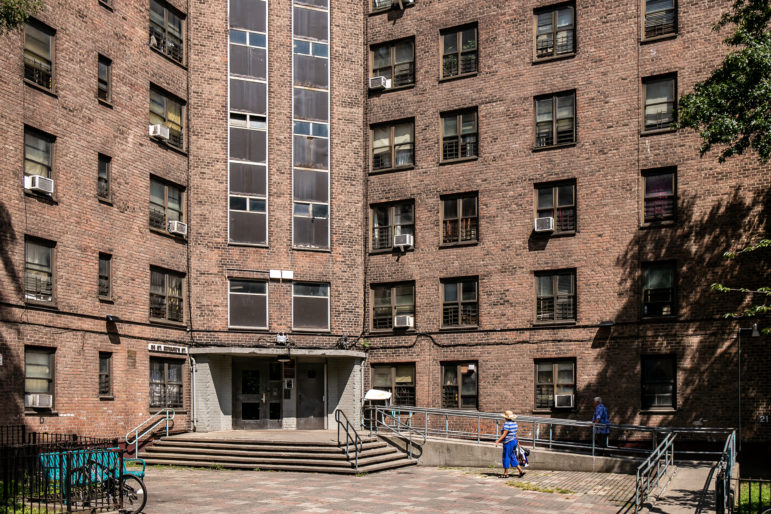‘We call on the next mayor to invest… $2.5 billion for affordable housing rental and homeownership opportunities and $1.5 billion for the New York City Housing Authority (NYCHA), and to move the city’s reporting structure away from raw production totals and into more meaningful areas, including racial equity and levels of affordability.’

Adi Talwar
A New York City Housing Authority building in the Ingersoll Housing complex near Downtown Brooklyn.New York City’s next mayor will lead a city facing a housing emergency: 315,000 renters are at risk of eviction, and tens of thousands of homeowners are at risk of foreclosure. New Yorkers are on the cusp of another round of federal aid to provide support before moratoriums and forbearance periods run out. But this problem runs deeper than COVID. Even before the pandemic, 76,000 people in New York City were homeless on any given night, and one million households were paying more than 30 percent of their income towards rent. The next mayor must address it head-on for the city to recover.
It was against this backdrop that we organized more than 80 organizations with expertise in housing, community development, homelessness, criminal justice, healthcare, real estate, and finance to help guide the next mayor through the labyrinth of municipal housing policy. Our coalition is proud to be a co-host of the first televised mayoral forum of the campaign on Thursday, where candidates will tell New Yorkers their plans to address the housing crisis. We hope that they will support the recommendations found within our final product, the United for Housing: From the Ground Up report, which outlines a blueprint for housing investment for the next mayor that will consolidate housing policy, pave the path for economic recovery, and address long-standing racial and economic inequities.
This cannot be accomplished without historic investment. We call on the next mayor to invest $4 billion annually – with $2.5 billion for affordable housing rental and homeownership opportunities and $1.5 billion for the New York City Housing Authority (NYCHA) – and to move the city’s reporting structure away from raw production totals and into more meaningful areas, including racial equity and levels of affordability.
While the proposed investment would be an unprecedented level of funding, the reality is that it is smart economic policy: housing development creates jobs, boosts local communities, and makes the city more affordable. And short-term investment today staves off tomorrow’s budget crunch: study after study shows homelessness to be more expensive than permanent housing, while homelessness and housing insecurity can impact education and mental and physical health. Furthermore, allowing New York to become even more unaffordable will drive working class families out of the five boroughs altogether.
 CityViews are readers’ opinions, not those of City Limits. Add your voice today!
CityViews are readers’ opinions, not those of City Limits. Add your voice today!
But solving this challenge is about more than dollars and cents: it is also about racial justice.
Institutional racism has shaped New York City’s housing environment, amplifying the effects of the crisis for New Yorkers of color and creating racially and economically segregated neighborhoods. It is time for this to change – and this has already begun to happen through targeted rezonings in higher-income neighborhoods like Soho and Gowanus with access to transit, jobs, above average schools and other amenities. Deeply affordable housing must be required in any new developments.
But structural racism runs deep in housing policy. Its enduring legacy is an embarrassment the next mayor must not ignore. It starts with public housing, 90 percent occupied by Black or Latinx residents, and in desperate need of $40 billion worth of repairs. Decades of disinvestment created deteriorating conditions, which are a growing danger to the health and safety of many of its residents. While NYCHA has work to do to improve management and operations, ultimately the solution to reversing this injustice is simple: investment.
Homelessness is another problem with a simple solution: housing. Eighty-nine percent of occupants of the city’s shelters are people of color. Homelessness is preventable, just like these staggering racial disparities in housing instability. To end homelessness, the next mayor must look where it begins. The homeless system has institutional feeders like prisons and the foster care system, as well as institutional touchpoints offering opportunities for intervention like hospitals and domestic violence incidents. Increasing access to rental assistance is critical for homeless prevention.
The next mayor must view all of their housing proposals through the lens of equity and set clear policies to tear down historic barriers with bold solutions.
The pandemic has taken a toll on our city, and the path to recovery is unclear. But the vision for housing justice has never been clearer. The next administration’s housing plan must be the most ambitious in history, one that demonstrates our priorities, reverses course on past injustices, and invests in housing stability for our most vulnerable.
Our group, representative of the city’s leading housing experts and advocates, laid the blueprint for the next decade of housing policy. If the next mayor is willing to build upon it, we stand ready to be partners in New York’s recovery by making it more affordable and equitable and forever the greatest city in the world.
Rachel Fee is the Executive Director of the New York Housing Conference, which organized and authored the United for Housing: From the Ground Up report.









One thought on “Opinion: The $4 Billion Housing Blueprint for New York City’s Next Mayor”
Great idea, Where is the funding coming from?